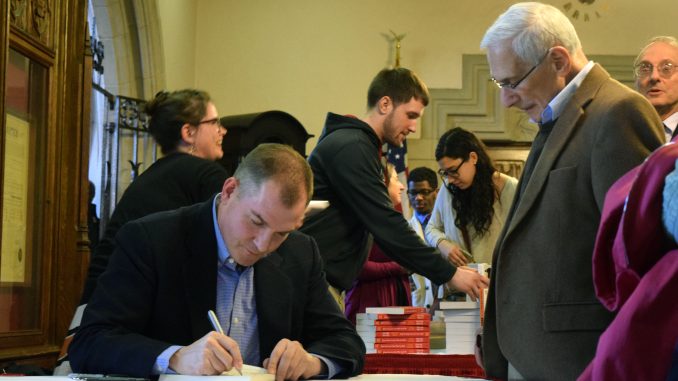
In between working on an upcoming profile of Jodie Foster and simultaneously mocking the latest antics of Donald Trump in the opinion pages, New York Times Op-Ed columnist Frank Bruni also reflects on issues of higher education.
“At the moment I wrote my first kind of college column, I was taken aback by the glimpse I had gotten into the admissions process today,” Bruni told The Temple News. “My niece had just gone through it and she’d gone through it simultaneously with the children of a lot of friends.”
“So I wrote a column that was kind of about how crazy admissions had become, how flawed and rigged it had become and how crazy that was to me,” he added. “And I had such an incredible response that I realized, ‘OK, this is a topic. This is terrain that people actually really, really want to inhabit.’”
And so Bruni continued writing about the college admissions process, as well as the value of higher education in his columns. He also wrote the book, “Where You Go Is Not Who You’ll Be: An Antidote to the College Admissions Mania.”
On Friday, Bruni came to Main Campus to discuss these topics, as well as his own career. Bruni was the guest speaker for the College of Liberal Arts’ annual Leonard Mellman Distinguished Lecture.
Bruni addressed the crowd, gathered in the Feinstone Lounge of Sullivan Hall, recounting his time as a restaurant critic and describing his current career as an author and columnist as a sort of “unfinished liberal arts education.”
Bruni said a liberal arts education allows students to study various subjects and to encounter different ways of thinking. He said a liberal arts education combats what he often sees occurring on college campuses and in the media—polarization and isolation.
“So many people are only going to consume the media that reflects back at them what they already believe,” he said.
Molly Scott, who’s pursuing a Ph.D. in developmental psychology, said she reads Bruni’s columns, and she likes how he incorporates opposing viewpoints.
“He’s clearly a very liberal guy,” Scott said. “But he respects all voices and all viewpoints, which is his point. We need to be able to hear everyone without shutting people down just because we’re uncomfortable with what they’re saying.”
Bruni also discussed his own decision to attend the University of North Carolina at Chapel Hill instead of Yale University.
Bruni said his siblings all attended Princeton University, Dartmouth College or Amherst College with other students who were as wealthy, if not wealthier than their own family.
Laura Craig, assistant director of internships at the Career Center, said Bruni’s stories about his own college experience resonated with her.
“I think he presented a very common situation for students at that time of feeling like, ‘Oh my gosh, if I don’t go to this school my life does not have meaning,’” Craig said.
“I’ve had that conversation a lot with students where it’s like, ‘Let’s calm this down a little bit,’” Craig said. “I personally am a big believer that what you get out of it is based on what you put into it.”
At UNC, Bruni said he was able to meet people who he otherwise wouldn’t have met.
“My friends worked jobs waiting tables,” he said. “It was about not being able to stay on that very narrow spectrum of color.”
Bruni also said that Temple, because of its diversity, is the “perfect” place not to “fall into the trap of a homogenous enclave.”
Before concluding his talk and taking questions from the audience, Bruni encouraged students to remain curious and to use college as an opportunity to explore subjects outside their intended career field.
“The liberal arts is ultimately about context and … the yardstick of possibility,” he said.
Jenny Roberts can be reached at jennifer.roberts@temple.edu.


Be the first to comment